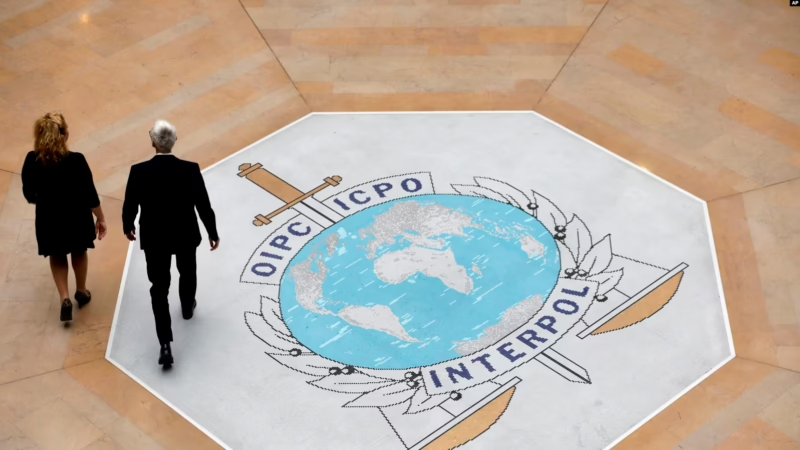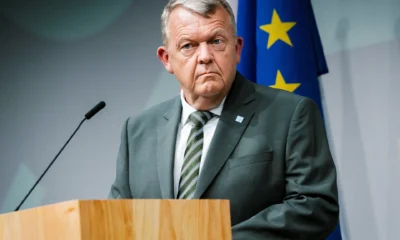Crime
Copenhagen Crackdown: Danish Authorities Target Hashish Trade in Christiania

Danish authorities have launched a crackdown on the illicit hashish trade in Christiania, a self-proclaimed autonomous neighborhood in Copenhagen, known for its alternative lifestyle and open cannabis market.

Police Raid Pusher Street: In a coordinated operation, law enforcement officers descended on Pusher Street, the notorious marketplace for hashish and other drugs within Christiania. The raid aimed to disrupt the illicit trade and dismantle the networks facilitating the sale of narcotics in the area.
Seizures and Arrests: During the operation, police confiscated a significant quantity of hashish and arrested several individuals suspected of involvement in drug trafficking. The crackdown underscores the Danish government’s commitment to combatting drug-related crime and ensuring public safety.
Authorities Respond: Lars Ole Karlsen, Copenhagen’s police chief, emphasized the importance of enforcing the law and maintaining order in Christiania. “We cannot accept that parts of Christiania have been characterized by organized crime and the blatant sale of illegal drugs,” stated Karlsen. The raid sends a clear message that such activities will not be tolerated.
Community Reaction: The raid has sparked mixed reactions within the Christiania community, with some residents expressing support for the crackdown, citing concerns about public safety and the negative impact of drug trafficking on the neighborhood. Others, however, view the police intervention as an infringement on Christiania’s autonomy and a disruption of its unique culture.
Ongoing Efforts: The raid on Pusher Street is part of broader efforts by Danish authorities to address drug-related issues in Christiania and across the country. While the operation marks a significant step in combating the illicit trade, challenges remain in tackling the underlying factors driving drug consumption and trafficking.
Conclusion: As Danish authorities continue their crackdown on the hashish trade in Christiania, the operation serves as a reminder of the ongoing struggle to balance law enforcement priorities with respect for community autonomy and individual freedoms. The outcome of these efforts will shape the future of Christiania and contribute to Denmark’s broader approach to drug policy and public safety.
Crime
Interpol Arrests 260 in Africa Over Online Romance and Sextortion Scams

Interpol arrests 260 suspects in romance and extortion scams across 14 African countries, exposing growing cybercrime networks targeting victims worldwide.
Interpol announced Friday that a sweeping crackdown across 14 African countries led to the arrest of 260 suspects tied to online romance and extortion scams, underscoring the continent’s growing role as a hub for digital-enabled crime.
The two-month operation, conducted in July and August, targeted networks accused of duping more than 1,400 victims and stealing nearly $2.8 million through fake online relationships, bogus fees, and sextortion schemes.
“Cybercrime units across Africa are reporting a sharp rise in digital-enabled crimes such as sextortion and romance scams,” Cyril Gout, Interpol’s acting executive director of police services, said in a statement. “The growth of online platforms has opened new opportunities for criminal networks to exploit victims, causing both financial loss and psychological harm.”
Authorities in Ghana arrested 68 suspects accused of creating fake identities to trick victims into paying fraudulent shipment fees or to extort them with secretly recorded intimate videos.
In Senegal, 22 suspects allegedly posed as celebrities on social media and dating platforms to scam over 100 people out of $34,000. In Ivory Coast, 24 suspects were accused of using fake profiles to blackmail victims with explicit images.
The crackdown highlights both the sophistication of these networks and the vulnerability of victims who often suffer not only financial ruin but also emotional trauma. Investigators say the scams are increasingly transnational, with perpetrators in Africa targeting individuals in Europe, North America, and Asia.
Interpol, headquartered in Lyon, France, said the arrests show the importance of coordinated policing across its 196 member states.
The organization has recently flagged a surge in online fraud and child exploitation cases, warning that cybercrime syndicates are becoming more organized and more difficult to track.
For victims, the numbers only scratch the surface. Analysts say romance scams are vastly underreported, as shame and stigma often prevent people from seeking help. But Friday’s announcement sends a clear message: law enforcement is beginning to close in on a criminal economy once thought untouchable.
Crime
INTERPOL Targets African Crime Syndicates, Arrests 1,209 in $97 Million Cybercrime Crackdown

INTERPOL has announced one of its largest cybercrime operations on the African continent, arresting more than 1,200 suspects and recovering close to $100 million in stolen assets.
The operation, codenamed Serengeti 2.0, ran from June to August 2025 under the African Joint Operation against Cybercrime with funding from the UK’s Foreign, Commonwealth and Development Office. Authorities across multiple African states coordinated to dismantle criminal networks running online fraud, cryptocurrency scams, and human trafficking schemes.
In total, 1,209 suspects were arrested, 88,000 victims identified, $97.4 million recovered, and more than 11,400 malicious online infrastructures dismantled, INTERPOL said.
“This global network is stronger than ever, delivering real outcomes and safeguarding victims,” said INTERPOL Secretary General Valdecy Urquiza. “Each operation builds on the last—deepening cooperation, sharing information, and sharpening investigative skills across borders.”
Major Busts Across the Continent
Angola: Authorities seized more than $37 million worth of cryptocurrency mining equipment and shut down 25 mining centers operated by 60 Chinese nationals. The Angolan government said the assets would be repurposed to strengthen power distribution for vulnerable communities.
Zambia: Investigators broke up a massive $300 million fraudulent investment scam that duped 65,000 victims into downloading fake apps for “high-yield” crypto returns. Fifteen suspects were arrested, and a linked human trafficking ring was also disrupted.
Ivory Coast: A long-running inheritance scam traced from Germany was dismantled, halting $1.6 million in losses. Victims were lured with promises of fake inheritances, one of the oldest internet fraud models still generating significant profits.
INTERPOL said the crackdown demonstrates how international coordination is now critical to tackling cyber-enabled crime, which crosses borders as seamlessly as the technology it exploits.
For victims, the arrests offer some measure of justice. For law enforcement, the message is clear: the fight against digital crime in Africa is no longer fragmented but increasingly global.
Crime
International Manhunt Ends with Court Appearance

More than a year after fleeing the country, Salman Haji, 20, appeared in a King County courtroom Thursday to face serious felony charges, including first-degree murder, tied to the fatal shooting of Yuan Ming at a Tukwila Costco during a 2024 robbery.
Authorities say Haji allegedly shot Ming, a Chinese-American visitor, while she was helping her sister load groceries. The incident sent shockwaves through immigrant communities, especially Somali Americans closely following the case.

Haji’s co-defendant, Ilyiss Abdi, also 20, was arrested earlier and charged in connection with the same crime. Investigators say Abdi drove a stolen Porsche SUV as the pair circled the Costco parking lot before targeting two elderly women. The shooting occurred during a struggle when Haji attempted to grab one sister’s purse and Ming leaned over to assist.
Following the shooting, Haji vanished from the U.S. on February 1, 2024, after being named on social media as a suspect. FBI agents believe he first fled to Somalia, hiding out in Mogadishu under aliases and moving frequently to avoid detection.
Months passed with no trace, but by late 2024, intelligence placed him in Kenya, where stronger law enforcement ties with the U.S. exist. Working with Kenyan authorities, FBI agents tracked him to a Nairobi neighborhood and arrested him without incident earlier this year. He was handed over to FBI custody on July 18, 2025, after Kenyan officials revoked his visa.
Alongside the murder charges, Haji faces a separate federal indictment for an armed carjacking committed the same day as the Costco incident. The case has stirred strong feelings within the Somali American community, which condemns the crime but also worries about rising hate speech and xenophobia.
The arrest formed part of the FBI’s “Summer Heat” operation, targeting violent fugitives nationwide. FBI Special Agent W. Mike Herrington stressed their commitment: “Even if suspects flee abroad, we’re not giving up. We will find them and bring them to justice.”
At Thursday’s hearing, Ming’s daughter, Zoe, opposed her mother’s alleged killer being shielded from public view. “My mother was murdered in public. He should not be hidden from us now,” she said emotionally. The judge denied the defense’s request to block media coverage, allowing cameras to record the proceedings.
Haji pleaded not guilty and remains held on $5 million bail, while Abdi stays in custody on $6 million bail.
Crime
Interpol clamps down on cybercrime, arrests 1,006 suspects in Africa

Interpol’s recent Operation Serengeti marked a significant milestone in the fight against cybercrime in Africa, resulting in the arrest of over 1,000 suspects across 19 countries. This large-scale effort, conducted in partnership with Afripol, not only disrupted criminal networks but also highlighted the growing sophistication and financial impact of cybercrime on the continent and globally.
Scope and Success of Operation Serengeti
The operation, conducted from September to October, targeted a wide array of cybercrimes, including ransomware attacks, business email compromise (BEC), digital extortion, and online scams. The results were staggering, with authorities identifying tens of thousands of victims and financial damages nearing $193 million worldwide.
The arrest of 1,006 individuals represents a significant leap compared to prior operations in Africa, which had netted only 25 arrests over the last two years. This dramatic improvement underscores the increasing capacity of African law enforcement to collaborate with international partners, leverage intelligence, and deliver tangible results in combating cybercrime.
Notable Cases and Criminal Tactics
Among the high-profile cases were:
Kenya: Nearly two dozen arrests in connection with an online credit card fraud operation causing $8.6 million in losses.
Senegal: The dismantling of a $6 million online Ponzi scheme involving five Chinese nationals.
Cameroon: A network exploiting multi-level marketing scams for human trafficking.
Nigeria: A cryptocurrency investment scam targeting victims internationally.
These cases reveal the diversity of cybercriminal tactics, from traditional scams and fraud to more complex schemes involving cryptocurrency and virtual platforms.
Emerging Challenges in Cybercrime
The operation also highlighted emerging threats, including AI-driven malware and advanced cyberattack techniques. These developments pose significant challenges for law enforcement, requiring continual adaptation and investment in cyber capabilities.
Afripol’s focus on these new threats signals a proactive approach to addressing the rapidly evolving landscape of cybercrime. However, it also underscores the need for enhanced resources, training, and cross-border collaboration to keep pace with these developments.
A Global Effort with Local Impact
Operation Serengeti demonstrated the importance of partnerships between global organizations like Interpol and regional bodies such as Afripol. Collaboration with private sector players, including internet service providers, also proved crucial in tracking suspects and disrupting operations.
Despite its successes, Interpol faces ongoing challenges, including limited funding compared to other international agencies like Europol and the FBI. These financial constraints make sustained progress against cybercrime dependent on resourceful partnerships and innovative approaches.
Future Implications
The operation’s success sends a clear message that cybercriminals operating in Africa can no longer act with impunity. It also establishes a foundation for more robust regional and international cooperation in combating online crime. However, as cybercriminal tactics evolve, so too must the strategies of law enforcement.
Moving forward, expanding technological capabilities, addressing funding gaps, and fostering stronger international collaboration will be critical to maintaining momentum in the fight against cybercrime in Africa and beyond.
BRICS
Unlocking Somaliland: A New Dawn for Investment and Opportunity

Somaliland is emerging as a beacon of potential, rich in untapped resources and poised for a transformative future. With its strategic location, stable governance, and a wealth of natural assets, this region is quickly becoming an attractive destination for foreign investors. As President Abdirahman Mohamed Abdullahi Irro leads the charge for Somaliland’s recognition on the global stage, the time is ripe for international investors, particularly from dynamic economies like USA, to engage with this promising territory.
Somaliland’s landscape is dotted with significant reserves of oil and various minerals, including gypsum, limestone, salt, and iron ore. The promise of these natural resources presents a unique opportunity to catalyze economic growth and job creation. By investing in sustainable extraction technologies, foreign investors can not only harness these resources but also contribute to the development of local economies, laying the groundwork for a prosperous future.
Situated along the Gulf of Aden, Somaliland enjoys a prime geographic advantage, serving as a natural hub for trade that connects Africa with the Middle East and beyond. This strategic position makes it an ideal location for logistics and commerce, further enhancing its appeal to potential investors. Coupled with a youthful population eager to adapt and innovate, Somaliland offers a workforce that is primed to meet the demands of various sectors, including technology and agriculture.
To effectively attract foreign investment, Somaliland must embrace the power of storytelling—crafting a narrative that resonates with prospective investors. This story should highlight the region’s vision for growth, showcasing local entrepreneurs who have thrived against all odds. By sharing these success stories, Somaliland can illustrate its resilience and potential, inviting investors to join in its journey.
The cultural richness of Somaliland is another key facet of this narrative. The warmth and hospitality of its people are a vital part of the experience, making the region an inviting place for businesses to establish roots and foster meaningful connections. As Somaliland strives for international recognition, it is crucial to underline the political stability and governance structures that have allowed it to maintain peace and security, making it a more attractive locale for investment.
To further bolster interest from global investors, Somaliland could benefit from the establishment of a dedicated investment promotion agency—a one-stop shop to provide tailored support and information about investment opportunities. This initiative could include the development of a robust digital presence through social media and targeted outreach, ensuring the narrative of Somaliland’s potential reaches audiences far and wide.
Hosting international investment forums presents another avenue for engagement, inviting business leaders from around the world, especially from tech sector, to explore opportunities firsthand. Networking events can facilitate connections that ignite collaborations and encourage dialogue about Somaliland’s investment potential.
In particular, the tech industry stands poised to thrive in Somaliland. Companies in fields like agritech, health tech, and fintech can find fertile ground for innovation and growth. By providing customized incentives, such as tax breaks and partnership models with local businesses, Somaliland can create an inviting atmosphere for investment.
A collaboration with international organizations can further lend credibility to Somaliland’s efforts. Partnerships with influential entities such as the World Bank or the African Development Bank can enhance visibility and provide a sense of security for potential investors, showcasing a commitment to sustainable practices and innovation.
At its core, the story of Somaliland is one of resilience and opportunity. As President Irro’s government embarks on this new chapter, global investors—especially those from UK, and EU—are invited to discover the vast resources and investment opportunities that await. This is more than just a financial decision; it is a chance to forge connections with a community eager for growth, innovation, and partnership.
As the world turns its gaze toward Somaliland, join in unlocking the full potential of this extraordinary region. Together, investors and Somaliland can build a promising future, establish a unique narrative of success, and elevate Somaliland on the global stage as a vibrant hub for investment and development. Now is the time to be part of this transformative journey.
Crime
London’s Phone Snatcher Used e-bike to Steal 24 Devices in an Hour

Sonny Stringer, London’s Infamous Phone Thief, Jailed for Two Years After High-Speed Pursuit and Massive Theft Spree
Sonny Stringer, the city’s most infamous phone snatcher, has been sentenced to two years behind bars. The 28-year-old’s audacious thefts, carried out on a high-powered electric bike, culminated in a dramatic chase that saw him piloting through the streets at speeds of up to 50mph, leaving a trail of stolen phones and near-misses in his wake.

Stringer’s criminal escapades reached a fever pitch on March 26, when he and an unknown accomplice embarked on a theft spree that would stun the city. Over the course of less than an hour, Stringer pilfered 24 mobile phones from unsuspecting tourists and commuters, using his e-bike’s impressive speed and agility to evade capture. His brazen crimes included mounting pavements, narrowly missing pedestrians, and running red lights—all while being pursued by a determined police patrol.
The thrill ride came to a dramatic halt when Stringer’s reckless flight across London’s bustling streets drew the attention of an unmarked police vehicle. As Stringer sped along Cheapside, a busy thoroughfare near the Bank of England, he attempted to evade capture by veering towards the pavement. In a split-second decision to protect pedestrians, officers executed a tactical contact maneuver, clipping his back wheel and sending him sprawling onto the asphalt.
Even after his bike crash-landed him on the street, Stringer tried to make a run for it, but the chase was far from over. As he scrambled to escape, he discarded a bag containing 22 of the stolen phones, while two more were recovered nearby. His capture marked the end of a thrilling chase and a notorious crime wave that had plagued London’s streets.
Appearing at Isleworth Crown Court, Stringer pleaded guilty to the theft of 24 phones. His sentencing included 20 months for theft and an additional four months for dangerous driving, reflecting the severity of his crimes and the high risk he posed to public safety.
Chief Superintendent William Duffy, commenting on the case, emphasized the significant impact of phone snatching on victims and the importance of justice in such cases. “The successful capture and prosecution of a prolific phone snatcher highlights the City of London Police’s commitment to tackling street crime and protecting our community,” Duffy said. He lauded the combined efforts of the control team, response officers, and investigators who worked tirelessly to bring Stringer to justice and return stolen phones to their rightful owners.
In light of this dramatic case, Duffy also issued a public safety reminder: “We urge people to be aware of their surroundings when using their phones on the street. Reducing the visibility and frequency of phone use can help minimize the opportunities for criminals to target you.”
The arrest of Sonny Stringer serves as a stark reminder of the risks associated with phone snatching and the lengths to which criminals will go to exploit unsuspecting victims. As London breathes a sigh of relief following Stringer’s capture, the case underscores the ongoing battle between law enforcement and street-level crime in one of the world’s most vibrant cities.
Corruption
Farah Maalim Bragging About Stolen Millions Sparks Outrage
A Shocking Admission
An explosive audio clip of Farah Maalim, MP for Daadab and former Deputy Speaker of Kenya’s National Assembly, has surfaced. In the recording, Maalim boasts about embezzling millions of dollars during his tenure.
Speaking in Somali on Twitter Space, he reveals how he exploited his position as deputy speaker and chairman of the Parliament Liaison Committee to pocket substantial sums from the allocated parliamentary funds.
Timing and Context
The timing of this revelation is critical. Maalim is already under fire for advocating violence against 5000 Gen Z protesters who stormed Parliament to oppose the now-withdrawn Finance Bill 2024. This audio adds fuel to the controversy, portraying Maalim as both corrupt and violent.
“In January, Farah Maalim claimed on Somalia Twitter spaces.
He openly boasted about not needing money because he was in control of "hundreds of millions of dollars" during his tenure as Deputy Speaker.” pic.twitter.com/4FEgTmJ7xm
— BRAVIN YURI (@BravinYuri) July 10, 2024
Crime
Congo’s Children: Victims of Conflict and Violence
Congo’s Children: Recruited, Raped, and Killed in Conflict
In a powerful plea to the U.N. Security Council, a Congolese teenager highlighted the dire situation of children in the Democratic Republic of Congo (DRC), where ongoing conflict between the military and various armed groups continues to wreak havoc on young lives. This 16-year-old, whose identity remains protected, spoke through an interpreter, urging international action to defend the rights and lives of Congolese children.
The United Nations verified nearly 4,000 grave violations against children in the DRC last year alone. This included the recruitment of over 1,800 children by armed groups, alongside numerous instances of abduction, maiming, and killing. The country’s rich natural resources have long fueled violent struggles for control, with 16 armed groups named for committing a range of atrocities against children.
The teenager addressing the Security Council recounted his own harrowing experience. Abducted while on his way to school, he and his friends were forcibly recruited, beaten, and threatened with death if they tried to escape. Forced to steal food and endure constant danger, he spent three years in captivity before seizing a chance to escape. His story, while ending in a fortunate rescue and return to school, stands in stark contrast to the many children who remain trapped in such brutal circumstances.
The situation for girls is particularly dire. Many are abducted and subjected to sexual violence, including rape, forced marriage, and sexual slavery. The UN report documents 279 cases of sexual violence against girls last year. Girls abducted by armed groups often become “wives” of commanders or are otherwise exploited by soldiers.
Sexual violence as a weapon of war is escalating. Ted Chaiban, UNICEF’s deputy executive director, highlighted the increasing use of sexual violence by armed groups. Reports from North Kivu province show a doubling of sexual violence cases in the first half of 2024 compared to the previous year, with 15,000 cases reported. The grim reality is that women and girls are often forced to carry condoms to minimize health risks during inevitable attacks.
The DRC is facing one of the world’s largest internal displacement crises, with over 7 million people affected. The conflict’s intensification coincides with the planned withdrawal of the U.N. peacekeeping mission, further exacerbating the risk of a humanitarian catastrophe.
The United Nations and humanitarian organizations are calling for urgent international intervention. The protection of children and the prevention of further atrocities require a concerted global effort. Addressing the root causes of the conflict, ensuring the safety of displaced populations, and providing support for victims of violence are crucial steps towards stabilizing the DRC.
As Congo’s children continue to bear the brunt of the conflict, the international community must act decisively to protect these vulnerable lives. The harrowing accounts of abduction, forced recruitment, and sexual violence underscore the urgent need for intervention and support. The plight of these children is a stark reminder of the human cost of ongoing conflicts and the imperative of global solidarity in the face of such crises.
-

 Minnesota2 months ago
Minnesota2 months agoFraud Allegations Close In on Somalia’s Top Diplomats
-

 Middle East2 months ago
Middle East2 months agoTurkey’s Syria Radar Plan Triggers Israeli Red Lines
-

 Editor's Pick2 months ago
Editor's Pick2 months agoWhy India Is Poised to Become the Next Major Power to Recognize Somaliland
-

 ASSESSMENTS2 months ago
ASSESSMENTS2 months agoSomalia’s Risky Pact with Pakistan Sparks Regional Alarm
-

 Analysis2 months ago
Analysis2 months agoTurkey’s Expanding Footprint in Somalia Draws Parliamentary Scrutiny
-

 Analysis2 months ago
Analysis2 months agoRED SEA SHOCKER: TURKEY’S PROXY STATE RISES—AND ISRAEL IS WATCHING
-

 Somaliland1 month ago
Somaliland1 month agoF-35s Over Hargeisa: The Night Somaliland’s Sovereignty Went Supersonic
-

 Somalia2 months ago
Somalia2 months agoIs Somalia’s Oil the Price of Loyalty to Turkey? MP Blows Whistle on Explosive Oil Deal































